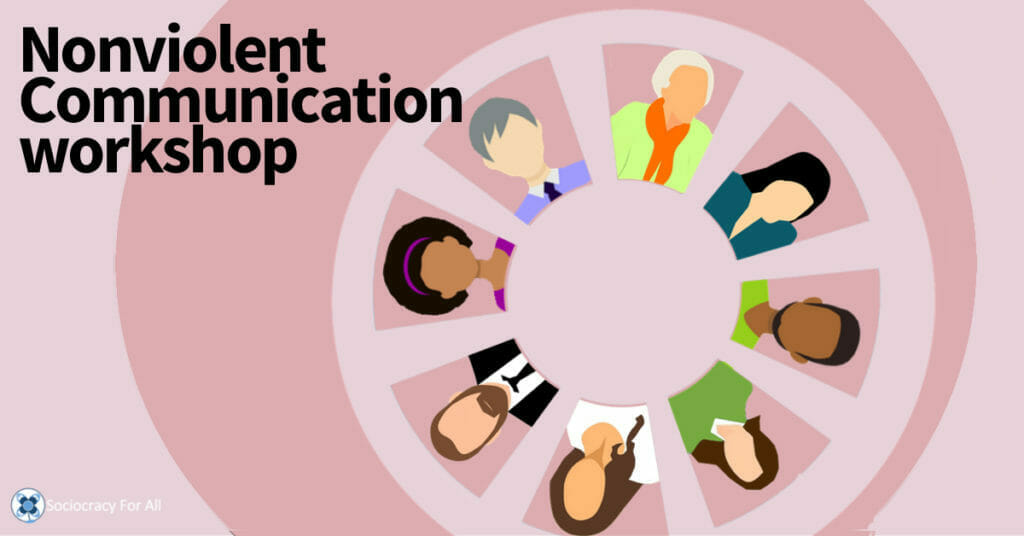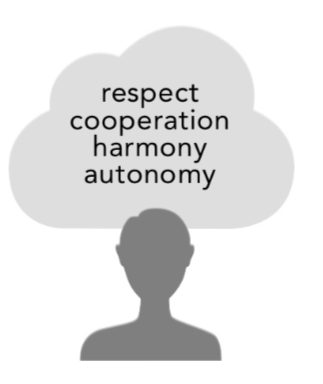Performance reviews are a way to increase accountability and connection in a peer-based process. They are a highly useful way of receiving feedback from the people who know you best in your role in your organization – your coworkers.
The process below spells out a format that supports a respectful, constructive, and self-responsible way of giving and receiving feedback. Note: Performance reviews as a peer feedback process in sociocracy are also called role feedback or role reviews.
Who should be involved?
The first step is to have the right people in the room. The goal of performance reviews is to give feedback to you on your role(s) in the organization, across all your most significant roles. You can do a performance review in your circle if you are only part of one circle or assemble a group just for this performance review.
The idea is that every level relating to the focus person is represented. Watch out not to make the group bigger than 5-8 people so a deep, trustful and meaningful review can happen.

The focus person
The focus person is the person reviewed by their fellow co-workers in the peer feedback process.
The focus person of the performance review:
- determines the members of the performance review
- sets a date and time for the performance review
- appoints a facilitator
- gives the members of the performance review access to relevant documents.
How to run a performance review
This format makes it easy to run a performance review and increase accountability!

Check-in, ADMIN and Consent to agenda
Check-ins are an essential part of every sociocratic meeting (see the chapter on meeting format on the website), just as consent to who fills roles and what the agenda of the meeting will be. The performance review process follows the regular meeting pattern, including ADMIN and consent to agenda as standard elements of the meeting format in sociocracy.
Understand roles
Before giving feedback, it’s best to understand what the roles are that the person holds. It’s common to share extra context, like a list of roles, how many hours are allotted to them and/or how long the person has been filling them. Make sure to allow questions so everyone is on the same page.
What went well?
Next, the group does one round on what the focus person has achieved in the areas of content, process, and interpersonal interaction. The focus person begins and ends.
Here are some possible statements that would include effective feedback in that round, both by the point person and by the other participants of the performance review:
Examples

- “I enjoy your leadership style. I experience you as reliable, for instance, when it got forgotten to call the electrician and you noticed that on time and were able to intervene successfully.”
- “I appreciate your voice in the circle. What you say always seems to add to the discussion. I very much admire how you always pass when you do not have anything new or relevant to say. To me, that just makes your voice more valuable because you seem to choose wisely what needs to be said, without taking yourself too seriously.”
- “I think your energy is great. Your attitude is positive and genuine, you seem to give this circle a sense of ‘we can do this’. I loved when you pulled out that diagram a few meetings back that showed all the ways of dealing with an objection. What I noticed was how important it was for the circle, and certainly for me, to be aware that we have options. You really moved the circle forward there in my view.”
- “I love how you seem to be the calm center of the circle. Even when people are stuck or excited and want to do everything at the same time, you keep calm, and in my opinion that contributes so much to the group because you’re a needed counterpart to us. That gives me some piece of mind because I know we might drop things but you will noticed. That also shows in your writing minutes, they are always correct and thorough and organized. That supports us all in doing our work.”
What didn’t go so well?
In the next round, people share what they would like to see improved. Again, the focus person begins and ends. That’s important because the process aims to improve accountability and self-responsibility – and speaking first invites the person quite naturally to “own up” and mention things before others will.
Everyone speaking should remember that, in our culture, this can be hard to hear because, in everyone’s past, ideas for improvement have been expressed using blame. To counteract, make an effort to be kind, loving and self-responsible – without compromising on what is true for you. Do not interpret their actions without making clear that you are interpreting and assigning meaning to their actions. More often than not, when we assign other people’s actions meaning, we are at least a little off.

So we cannot talk about our judgments? Yes, we can. Hearing your judgments is very valuable feedback for the focus person (and everyone else in the room), but they are probably not entirely true. Just be transparent about that. There is no rule “you cannot talk about this”. There is just the appeal to be true and transparent, and in a world without right and wrong, “true” has to be what your experience is and what is true to you, and transparency means to share how you come to your truth.
Below are some examples of what is traditionally called “negative feedback” (which, in this case, is not really negative feedback but expressing someone’s need not getting met sufficiently). Non-violent communication (NVC) is a great add-on set of practices and values when we want to give valuable and effective people to someone. (Have a look at this page to learn more about NVC and sociocracy.)

Examples
- “I have a hard time staying engaged during meetings in general, and it helps me when a meeting is structured so I know what’s going on. I would love for you to support me in that by saying more often, what the frame is for one round, and where we are in the process. Maybe we could put a poster up of the different steps, and then you and we could refer to it? That is my request to you because it would help me be more relaxed in meetings.”
- “I appreciate that you are carrying so much of the load when it comes to our finances. I would like to express some concern because we don’t seem to have any redundancy, which also means no one can help you, and I would like to have some basic understanding of how our coop is doing financially to give me some peace of mind. I trust but any role should have some redundancy. I would like for someone to learn from you so it does not always have to be you doing our finances.”
- “I have to say there is something that is not working for me. I often come in for my shift after yours and find food on the counter that belongs into the fridge. I am worried about safety here and I am sure that is something we can all get behind. I’d love to hear your observations and what comes up for you hearing this.”
A little hard-to-hear example
- “I have something to say that might be a little hard to hear because it is clearly judgmental from my part. I am aware that this is probably just a story that is going on in my head, but it impacts the way we work together. It is important for me to feel comfortable in all our meetings, and I am currently not comfortable when we talk about IT tools. I am often picking up on some impatience, and in me, it sounds like all the IT was easy to understand, while I am really struggling. Just taking care of myself for a second I would want to know that I am seen for my intentions which are to be productive and to be doing my best to learn the new tools. It is just something that seems to not flow as easily. I am actually curious how my judgment lands on you that, when it comes to that topic, you get annoyed and brief. I guess I already said my part: I am doing my best, and I’d like people to know that. If I am making up the part that you are annoyed with us and don’t think we’re trying hard enough, I’d like for you to share that so we can talk about it and are not stuck in projecting things about each other. If you do not hold any judgments there, then my request would be for you to be a bit more gentle with me because I get anxious when I do not feel competent, and I would sense judgment even where there is none, and this is hard for me and it is really impacting how I participate in our work here.”
Do you want to learn better how to give and request or give peer feedback in an effective way? Join the next NVC training by clicking below!

Find an upcoming NVC class online
3 x 2h online class on non-violent communication with focus on governance. Saying what’s really going on with integrity, while being open to hearing the other person’s truth.
Taught by Jerry Koch-Gonzalez, certified trainer of Nonviolent Communication®.
Improvement plan
The group can take some time to generate an improvement plan. Ideally, they gather areas first, like “work-life balance” or “improving follow-ups.”
Then gather actionable ideas, like “keep Fridays free of meetings” or “reserve 1h on Wednesdays to check on all promised follow-ups and complete what hasn’t been done.”
Those can be summarized into one improvement plan proposal which is approved by consent. The focus person has consent rights as well as everyone else who was part of the assessment circle. That way, we know there’s an agreement made on eye level, and our peer feedback process will be sure to get buy-in.

